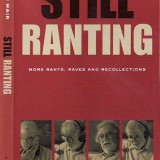There is a reason that we who want to save our environment are losing the war and may lose it outright unless we gird up our loins and fight to the death, politically speaking.
The reason is simple: no government set in authority over us will apply the “Precautionary Principle” (despite Canada’s international commitment to uphold it) to undertakings in the environment and thus they permit despoilers to get away with, literally, murder.
Here is the principle as generally stated. “The precautionary principle …states that if an action or policy has a suspected risk of causing harm to the public or to the environment, in the absence of scientific consensus that the action or policy is harmful, the burden of proof that it is not harmful falls on those taking the action.”
This is what this means to British Columbians – the Precautionary Principle prevails, or rather should prevail, in the following cases: Fish farming, power projects, threats to the atmosphere, pipelines and tanker traffic. It also should apply, in my opinion, to highway and bridge construction.
In fact, in each of the above cases the onus has rested not on the potential despoiler but on the general public. This turnabout provides the despoiler with a one line defence which runs, “You don’t really believe that crap do you?” That becomes an effective reply to the strongest scientific argument – it’s really a thinly disguised “Big Lie” technique.
Let’s look at how this has been applied.
For over a decade the persistent and courageous Alexandra Morton has led a scientific investigation into the adverse – to put it mildly – impact of sea lice from fish farms on migrating wild salmon. Her studies have been peer-reviewed (that is to say reviewed by other scientists and published in recognized scientific journals) by virtually every scientist in the world who deals in this area. Moreover many fish biologists have carried out their own peer reviewed studies which have concluded, as Ms. Morton has, that the impact from sea lice from fish farms is enormously destructive.
What have industry and the government done?
Through discredited former environmentalists like Patrick Moore and industry flacks like Mary Ellen Walling they’ve simply denied the findings and distorted the evidence hoping, and often succeeding, to be able to ask the public, “You don’t really believe that crap do you?”…”Would you deny British Columbians jobs because of unproved charges by some so-called scientist?”
NOT BEING REQUIRED TO DEMONSTRATE THE SAFETY OF WHAT THEY DO, THEY ARE ABLE TO SIT BACK AND RAISE DOUBTS ON NO EVIDENCE WHATSOEVER!
The ad hominem attack on a scientist by an industry or, sadly, government flack counts for more than properly researched science. Thus has the proper method of determining environmental safety been subverted to high priced PR flackery.
Thus the silly but effective question, “You don’t really believe that crap?” trumps science.
This industry/government defence has a slightly different twist when it comes to the private/public power debate. Here the government – wonders never cease – actually admits that some environmental harm could come from gutting rivers, diverting the water with dams and clear-cutting for roads and transmission lines; so they convene environmental hearings and in doing so don’t follow the “precautionary principle” – heaven forefend! – but the political principle which states simply, “Never hold a hearing unless you know what the result will be.” Consequently these hearings are convened by the company in a location least likely to be conducive to large crowds and the government fixes the result by making it out of order to ask any questions about the desirability of the scheme in the first place!
In short, by the time the public has a say, it’s a done deal and the only issue left is the terms of reference for the “scientific” investigation by – hold your breath now – the government that has already approved the deal in principle, and the “environmental department” and paid consultants of the company!
When Dr. John Calvert, Dr. Marvin Shaffer, noted scientists, economist Erik Andersen, environmentalists Joe Foy, Gwen Barlee, Damien Gillis or Rafe Mair lay before the public the facts on how the Liberals destroy the environment to make power BC Hydro must buy at a huge loss, putting BC Hydro in mortal peril, the company and government need only ask, “Do you believe that crap from those environmental maniacs?” – and the job is done.
With pipelines and oil tankers the story takes a slightly different tack. There have been so many spills and ruptures that neither government nor industry can deny that they happen – they would like to but even their PR flacks have some credibility limitations. The propositions put forward by the companies and their hired governments are even more breathtaking for they say that the risks are “reasonable” or “slight” or “manageable” – and outweighed by the stated (and grossly exaggerated) benefits.
Think on that for a second and several facts pop up. For one, if you are going to do something forever with no limitations on how often or how long you will do it, a spill or a leak is no longer a risk but a certainty waiting to happen.
Then comes the inevitable conclusion: when it happens it will be devastating! Every oil spill or leak is!
Thus the emollient offerings by company and government are met by the certainty that their project will be a major catastrophe, yet the cries of those who know that a catastrophe will certainly occur are drowned out by the cry, “Do you believe that crap from those people who don’t want any ‘progress’ and who hate industry?”
The absolute certainty of environmental catastrophe is met by bought-and-paid-for government and industry flacks who pour it on with the basic theme that “life is risky; we must take risks to develop and grow and create jobs and are you going to listen to that shit from eco-freaks like Rex Weyler?”
Let me ask of you this question: who of you, after the disaster, will agree it was a “risk” worth taking, especially when you’ve known in your tummy all along that it was no risk but a dead certainty?
The matter must be fairly stated – development in this province is done by corporations who don’t give a fiddler’s fart for the environment, and why should they? Their obligation is to make money for their shareholders, so why would we expect them to care? If they did care they would be in breach of their shareholders’ trust.
This industry finances the Liberal and Conservative governments – make no mistake on that account. Those governments have an obligation to repay that debt and can be counted upon to do so.
There is an interesting sidelight to all this. Opponents to the Liberal government either have a history – or have been painted as having a history of incompetence. That’s the rap and the Liberals play it like a finely tuned Stradivarius.
Is that to say that the government that has privatized BC Rail, forced BC Hydro to the brink of bankruptcy, run up huge deficits and nearly doubled the provincial debt while turning over our outdoors to large, mostly foreign corporations is to be seen as competent? A government that lies about its budget, the HST and destroys our environment is a good government?
I had plenty to say about the NDP governments in their 1991-2001 decade and very little of it complimentary. But compared to this Liberal bunch they were paragons of fiscal probity. Whatever index you like – corporate profits, economic growth, provincial debts and contributing deficits, employment – you name it – the NDP are clear winners and you only need read what the far right wing Canadian Taxpayers Federation has to say for the proof.
We, the people of British Columbia must, in my view, ponder the consequences of more of the same from this Liberal government: ruined rivers and streams, tar sands bitumen spilled on our virgin lands and in our oceans, our soul – the Pacific Salmon – destroyed, our coveted power company ransacked by private and mostly foreign corporations, our farmland and sensitive habitat ravaged; a government that promises more of the same and defends itself only by defaming those who are critical of it. A government that had to change the law to avoid balancing its books.
If you stop and examine the Liberal’s rationale for its uncaring attitude towards the environment, it fails and fails badly in economic terms. Their policies not only are ruinous to our environment, but they provide virtually no permanent jobs, bring little, if any, revenue into the provincial coffers and leave behind damage that will be with us forever.
Fish farms don’t produce jobs, only a handful of caretakers. The same applies to private power corporations after short term construction; pipelines and oil tankers not only don’t provide jobs, their profits go out of province. In short, the vaunted Liberal talent for enhancing the economy doesn’t do that – it enhances Alberta’s revenues and those of the huge corporations whose ads tell us how much they care, while leaving permanent destruction for us who live in its path.
All elections are crap shoots and all politicians disappoint. We are, however, looking at an opposition that has a much strengthened and experienced front bench; it is an opposition that has put a great deal of its political cant behind it while retaining what I see as critical sensitivity to our traditions and the legacy we leave; it is also an opposition that has learned bitter lessons from its past.
It is possible to have social sensitivity and prosperity – in fact the latter, if it’s to last, must have the former. That the NDP have learned that destruction of our environment doesn’t bring prosperity is surely a plus.
Looking at the choice that faces us I can see no sensible alternative to throwing out the Liberals – and the sooner, the better.









